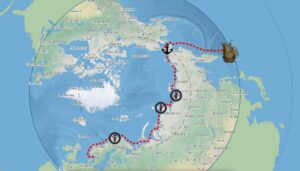Instant gratification and instant connection are all that many of us know. But this isn’t the case for everyone. The Komi people of Russia’s arctic tundra have voluntarily chosen to forsake modernity for their reindeer-herding traditions.
Soviet-era hardships
Stalin persecuted the Komi for being different. He banned their folklore practices and even their language. Somehow, they managed to endure, almost completely cut off from the outside world until after World War II. That isolation may have saved them.

Chums in Yamal, Russia. Photo: Karasev Viktor/Shutterstock
Instead of brick houses, they have chums (tents). Instead of cars, they have reindeer-drawn sleds. Instead of phones, they have high-frequency radios. When traveling great distances, the Komi use their sleds, trucks, and sometimes even old Soviet army tanks.

Komi women in their traditional garb. Photo: Kirill Skorobogatko/Shutterstock
The Komi’s life is about preparedness for long journeys, following their 5,000 reindeer. When necessary, they dismantle their chums, round up the herd, and migrate to either the mountains or the forest. Their life is designed for mobility. While on the move, they set up their chums each night and pack them up against the next morning.
https://www.youtube.com/watch?v=ECsubZDT46M
Then there is the Siberian winter. Trudging hundreds of kilometers through the snow does not deter them. They know how to travel, and how to endure.
Will the Komi way of life last?
Why not forsake these harsh lands in favor of the comforts of urban life? Why not build a modern life that is not about daily survival? The answer is that the land and its challenges form their identity.
Some of the younger generation are tempted away. Occasionally, parents send their children to the closest towns to live with relatives and see how different their lives could be.
Others don’t see the appeal. “I spent all my life here. Why would I go to the city where everything is different,” one Komi man says.
Ultimately, like everyone, the Komi need purpose. Perhaps for them, the wilderness offers this and the cities take it away.






